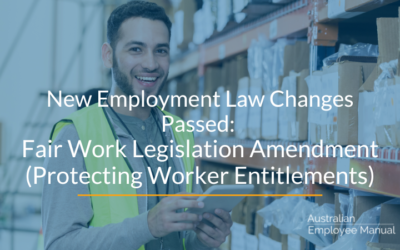After a long-running review of modern award clauses before a full bench of the Fair Work Commission, changes were made to enable regular casual employees to request to be converted to permanent employment from 1 October 2018.
This is not a blanket ruling, which means that while the majority of awards will have the same clause, there are also some differences across some awards to take account industry-specific needs.
The model clause is as follows:
Right to request casual conversion
(a) A person engaged by a particular employer as a regular casual employee may request that their employment be converted to full-time or part-time employment.
(b) A regular casual employee is a casual employee who has in the preceding period of 12 months worked a pattern of hours on an ongoing basis which, without significant adjustment, the employee could continue to perform as a full-time employee or part-time employee under the provisions of this award.
(c) A regular casual employee who has worked equivalent full-time hours over the preceding period of 12 months’ casual employment may request to have their employment converted to full-time employment.
(d) A regular casual employee who has worked less than equivalent full-time hours over the preceding period of 12 months’ casual employment may request to have their employment converted to part-time employment consistent with the pattern of hours previously worked.
(e) Any request under this subclause must be in writing and provided to the employer.
(f) Where a regular casual employee seeks to convert to full-time or part-time employment, the employer may agree to or refuse the request, but the request may only be refused on reasonable grounds and after there has been consultation with the employee.
(g) Reasonable grounds for refusal include that:
(i) it would require a significant adjustment to the casual employee’s hours of work in order for the employee to be engaged as a full-time or part-time employee in accordance with the provisions of this award – that is, the casual employee is not truly a regular casual employee as defined in paragraph (b);
(ii) it is known or reasonably foreseeable that the regular casual employee’s position will cease to exist within the next 12 months;
(iii) it is known or reasonably foreseeable that the hours of work which the regular casual employee is required to perform will be significantly reduced in the next 12 months; or
(iv) it is known or reasonably foreseeable that there will be a significant change in the days and/or times at which the employee’s hours of work are required to be performed in the next 12 months which cannot be accommodated within the days and/or hours during which the employee is available to work.
(h) For any ground of refusal to be reasonable, it must be based on facts which are known or reasonably foreseeable.
(i) Where the employer refuses a regular casual employee’s request to convert, the employer must provide the casual employee with the employer’s reasons for refusal in writing within 21 days of the request being made. If the employee does not accept the employer’s refusal, this will constitute a dispute that will be dealt with under the dispute resolution procedure in clause X. Under that procedure, the employee or the employer may refer the matter to the Fair Work Commission if the dispute cannot be resolved at the workplace level.
(j) Where it is agreed that a casual employee will have their employment converted to full-time or part-time employment as provided for in this clause, the employer and employee must discuss and record in writing:
(i) the form of employment to which the employee will convert – that is, full-time or part-time employment; and
(ii) if it is agreed that the employee will become a part-time employee, the matters referred to in clause X.
(k) The conversion will take effect from the start of the next pay cycle following such agreement being reached unless otherwise agreed.
(l) Once a casual employee has converted to full-time or part-time employment, the employee may only revert to casual employment with the written agreement of the employer.
(m) A casual employee must not be engaged and re-engaged (which includes a refusal to re-engage), or have their hours reduced or varied, in order to avoid any right or obligation under this clause.
(n) Nothing in this clause obliges a regular casual employee to convert to full-time or part-time employment, nor permits an employer to require a regular casual employee to so convert.
(o) Nothing in this clause requires an employer to increase the hours of a regular casual employee seeking conversion to full-time or part-time employment.
(p) An employer must provide a casual employee, whether a regular casual employee or not, with a copy of the provisions of this subclause within the first 12 months of the employee’s first engagement to perform work. In respect of casual employees already employed as at 1 October 2018, an employer must provide such employees with a copy of the provisions of this subclause by 1 January 2019.
(q) A casual employee’s right to request to convert is not affected if the employer fails to comply with the notice requirements in clause XX(p) .
What this means
Here is a quick summary of what this means:
- All casuals who have been employed for more than 12 months on a regular and systematic basis with you can apply to be converted to full time or part-time
- Some awards/agreements have different clauses which may mean that casuals can apply after six
- Ccasuals need to apply to you in writing to have their employment status converted.
- You need to discuss their application with them, and if you refuse the application, you need to do so in writing within 21 days of the application.
- Any refusal needs to give the reasons why you have refused the application.
- There are guidelines as to what constitutes reasonable grounds for refusal.
- You are legally obliged to let all existing casual employees know about the new award provisions by 1 January 2019.
- You are legally obliged to let all new casual employees know about the conversion provisions within 12 months of their commencing work with you.
Read more about casual to permanent conversion decision.
What you need to do now
- Review all awards/ industrial agreements that cover your employees to understand what provisions apply in your situation.
- Update your employee manual to reflect the new conversion process. (Our Employee Manual contains an updated clause that you can use).
- Review your payroll processes to ensure that you know how to convert employees from casual to permanent and correctly account for things such as continuous service.
- Add a new step to your payroll processes for new casual employees to add a date when you will send them information about the Casual to Permanent Conversion process (e.g. at the 11th-month mark).
- Send a notice to all existing casual employees letting them know of the changes. (We have a template letter in our HR Forms pack of our Employee Manual).
- Review the rosters of all existing casual employees to determine any casuals with regular and systematic hours of work that should be converted to permanent employment.
One thing to remember is that often employees start as true casuals with irregular work and rosters, but over time we fall into patterns of work and rostering.
Recent cases including WorkPac Pty Ltd v Skene show that even though the employee may be called a casual and receive a casual loading, they may, in fact, be deemed as permanent for the purposes of the Fair Work Act. What this means is they may be entitled to back pay for leave and other conditions of employment.
It pays to regularly review all casual employees to ensure all are being paid correctly and that they are not, in fact, permanent employees.




